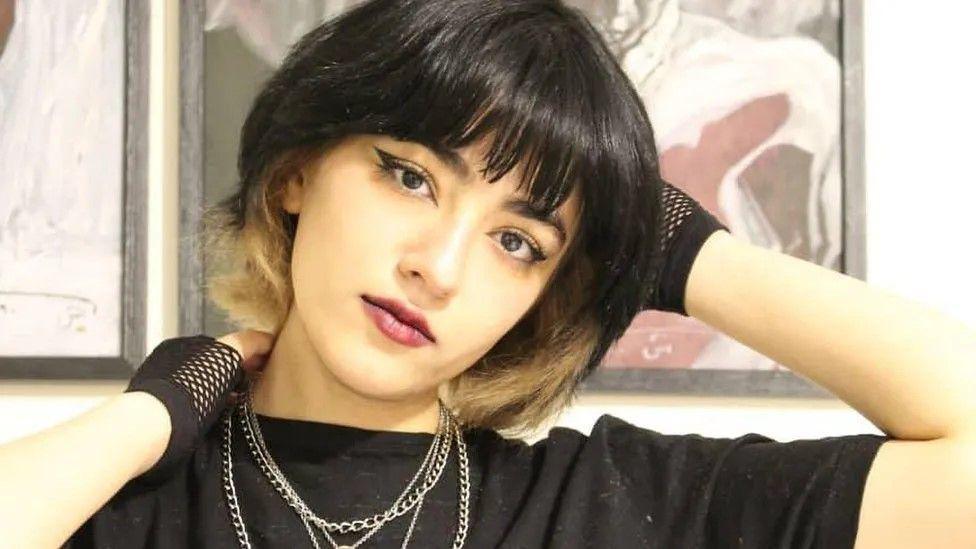Iran charges journalists after BBC report on teen protester's death

Nika Shakarami's family have rejected claims from officials that she killed herself
- Published
Iran's judiciary has filed charges against "a number of journalists and activists" after the publication of a BBC report alleging men working for the security forces sexually assaulted and killed a 16-year-old protester.
The judiciary-run Mizan news agency described the BBC Eye investigation into Nika Shakarami's death in 2022 as "fake, incorrect and full of mistakes".
It did not identify the individuals summoned for allegedly "disrupting the psychological security of society".
But two Iranian journalists who had commented on the report online said prosecutors had opened cases against them.
One of them, Mohammad Parsi, wrote on Twitter/X that the Tehran Prosecutor's Office had summoned him for publishing an "article about Nika Shakarami and the details of her murder".
The second, Marzieh Mahmoodi, posted that “neither the charges nor the details are known”.
On Wednesday, Interior Minister Ahmad Vahidi dismissed the findings of the BBC’s investigation as a plot by Iran's enemies, becoming the first official to comment publicly.
"Enemies and their media have resorted to false and unreal reports to carry out psychological operations," he told reporters outside a cabinet meeting, according to state media.
Mr Vahidi claimed it was "an attempt to divert attention" from the current pro-Palestinian protests in the US as well as Iran’s missile and drone attack on Israel last month.
There was no immediate comment from BBC News on the statements by Mr Vahidi and the judiciary.
Armed forces killed Iran teen, evidence suggests
- Published30 April 2024
Iran morality police arrest dead protester's sister, family says
- Published18 April 2024
Mother of teenager killed in Iran tells of anguish
- Published29 June 2023
Nika Shakarami became a symbol of the "Woman, Life, Freedom" protest movement that shook the Islamic Republic two years ago.
The protests erupted in response to the death in custody on 16 September 2022 of Mahsa Amini, a 22-year-old woman who had been detained by morality police in the capital for allegedly wearing her hijab "improperly".
On 20 September 2022, Nika was filmed at a protest in Tehran setting fire to her headscarf, while other protesters chanted "death to the dictator" - a reference to the Supreme Leader Ayatollah Ali Khamenei.
She disappeared that evening after telling a friend that she was being chased by security forces.
Her family eventually found her body at a mortuary more than a week later. They alleged that she died from blows to the head and rejected claims from officials that she had killed herself by jumping off the roof of a building.
The BBC Eye investigation, published on Monday, was based on what is understood to be a leaked internal document summarising a hearing on Nika's case held by the Islamic Revolution Guard Corps (IRGC).
According to the document, the teenager was detained by members of a paramilitary group who had been deployed by the IRGC as an undercover team to monitor protests in Tehran that day.
The document details a series of events that allegedly happened while Nika was restrained in the back of an unmarked freezer van along with three members of the team. These include:
One of the men molested her while he was sitting on her
Despite being handcuffed and restrained, she fought back, kicking and swearing
An admission that this provoked the men to beat her to death with batons
An IRGC officer ordered the men to dump her body on a street
The BBC report acknowledges there are numerous fake Iranian official documents in circulation, but says “extensive investigations indicate the papers we obtained do chronicle the teenager's last movements”.
The BBC also put the allegations to the IRGC and the Iranian government before publication and they did not respond.